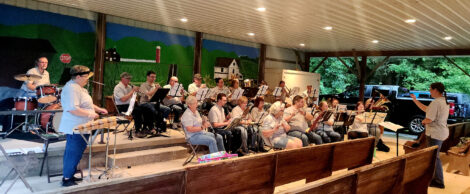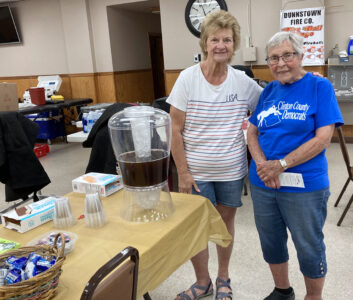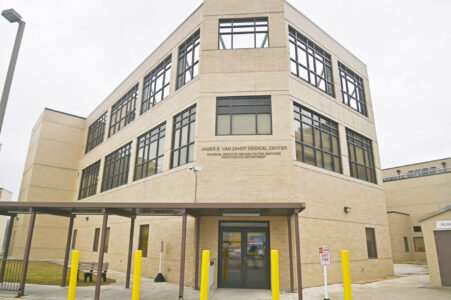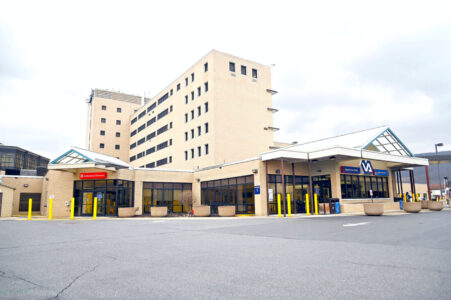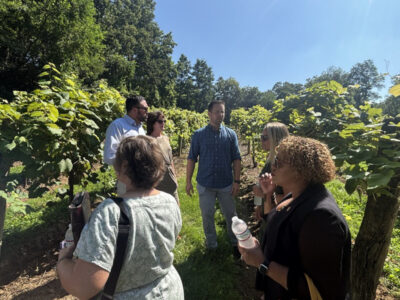Pa. wineries turn to lawmakers for legislation to protect the industry
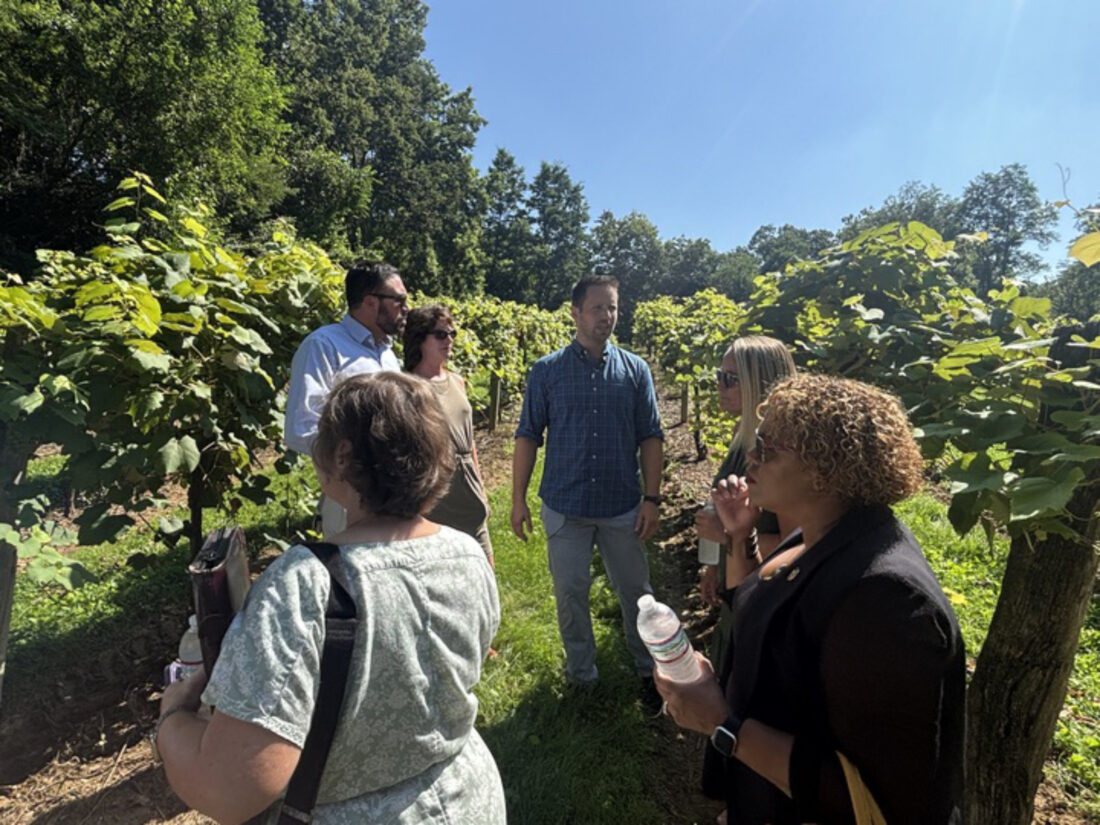
The Pennsylvania House Majority Policy Committee toured Nissley Vineyards, located in Lancaster County, and held a roundtable discussion on July 28, 2025. (John Cole/Capital-Star)
Jonas Nissley is the third-generation of his family to lead Nissley Vineyards in Bainbridge, Lancaster County. His father and grandfather opened the winery in 1978. His grandfather also helped found the Pennsylvania Wine Association, serving as its first president.
“I think small wineries like ours and others are really economic and cultural anchors where we are,” said Jonas, who serves as Nissley’s president and general manager. “Many of us are in rural areas and so in a sense, we’re like a watering hole for people near us.”
Pennsylvania ranks fourth in the nation for wine production, up a notch since 2018. It has more than 400 wineries operating over 14,000 acres of vineyards and producing more than 2 million gallons of wine each year.
Nissley noted that Pennsylvania’s wine industry has been around for roughly 50 years.
“Keep in mind that the California wine industry has been producing wine and growing grapes for about 100 years,” Nissley said. “So, we’re a young industry.”
“And I think that in the short time, we’ve made a lot of strides to grow the industry and make it what it is,” he added.
A recent Pennsylvania Department of Agriculture study showed that the grape and wine industry supports more than 10,700 jobs, paying more than $518 million in wages, and directly contributing more than $1.7 billion to the state’s economy each year. The industry also draws millions of visitors annually, which generates hundreds of millions of dollars in tourism revenue.
However, Nissley sees dark clouds on the horizon.
“And that threat is out-of-state wineries who are coming in and are acquiring a limited winery license,” Nissley said. “That license was designed to support PA wineries and PA agriculture and wineries who are purchasing PA grapes and PA fruits to create authentic Pennsylvania wines.”
“We’re seeing this more and more over the past 15 years and we’re trying to create legislation to give those businesses an opportunity to operate,” he said. “But not reap the rewards that the PA wineries should be reaping for protecting PA agriculture and an authentic PA wine brand.”
Nissley isn’t the only one concerned.
Robert “Bob” Mazza is the founder and CEO of Mazza Vineyards in North East, a borough in Erie County. Established in 1972, it’s one of the state’s oldest wineries and by producing nearly 500,000 gallons of wine and juice, it is Pennsylvania’s largest limited winery.
Last year, Mazza’s The Perfect Rose was one of only 20 U.S. wines to win a Gold Medal at the Decanter World Wine Awards, becoming the first and only Pennsylvania wine to earn the prestigious award.
But, he warned regulatory hurdles have been a roadblock for growth.
“We’re not fostering growth in the grape industry today with the way the regulations and the laws are being enforced, or lack thereof,” Mazza said.
Late last month, the state House Majority Policy Committee visited Nissley Vineyards for a tour and roundtable discussion about the most pressing issues facing the wine industry in the commonwealth.
Rep. Ryan Bizzarro (D-Erie), who serves as the chairman of the panel, told the Capital-Star he’s familiar with wineries in the state, noting that Erie County is home to several other large wineries, in addition to Mazza’s.
“It’s a huge industry. Agriculture is a big industry in Pennsylvania,” he said. “These wineries are drawing in people. They’re making money, and we’ve got to do everything we can to protect the integrity of Pennsylvania wineries and grapes.”
In 1968, the Limited Winery Act went into effect in Pennsylvania. The law permitted wineries to make up to 50,000 gallons of wine using fruit grown in Pennsylvania and allowed them to sell their wine directly to the public, hotels, restaurants, clubs and the Pennsylvania Liquor Control Board (PLCB).
“The intent was very simple,” Mazza said. “It was to foster growth in the wine and grape industry in Pennsylvania.”
“And the reason I emphasize that is because that isn’t the case today,” he added. “So, that’s very, very critical.”
To acquire a limited winery license, according to the PLCB, an in-state or out-of-state winery has to produce less than 200,000 gallons per year of alcoholic ciders, wines, meads, wine coolers and fermented fruit beverages. Each operation may have up to five board-approved locations and up to two storage areas.
But Mazza points to a U.S. Supreme Court case, which led to what he calls “the wild, wild west” in their industry.
In 2005, the Granholm v Heald Supreme Court case ruled that laws in Michigan and New York restricting out-of-state wineries to make direct sales to consumers was unconstitutional.
“We have wineries that are being given limited winery licenses that are out of state and I dare say out of the country,” Mazza said. “They have no investment in Pennsylvania. They have no incentive to follow Pennsylvania rules and regulations and the Liquor Control Board can’t enforce anything.”
Out-of-state wineries also do not pay the assessment of 20 cents per gallon tax on wine sold to the Pennsylvania Wine Marketing and Research program that promotes the wine industry in the state. In contrast, in-state wineries that pay thousands of dollars a year into that marketing order.
That’s where the Pennsylvania General Assembly can intervene with legislation, they argue.
“We need to create multiple license classes, just like all the surrounding states,” Zach Waltz, director of Operations at Waltz Vineyards Estate Winery in Manheim, Lancaster County, told the Capital-Star.
This would differentiate in-state wineries from out-of-state wineries who don’t primarily use Pennsylvania grapes.
“New York. Maryland. New Jersey. They all have created these different license types to address the need for out-of-state and out-of-country wineries,” Waltz said.
In New York, for example, this distinction is made with out-of-state wineries who apply for a winery license, while in-state wineries, which are required to use 75% New York state grapes and other fruits for its wine and wine products, apply for a farm winery license.
WineAmerica is a national association that aims to improve the wine industry across the country, by improving federal legislation regulating winemaking, sales and distribution. Michael Kaiser, the organization’s executive vice president, told the Capital-Star that WineAmerica isn’t involved in state-related legislation like this but, “it seems like a natural progression for their state to want to institute a new law like that to give these in-state producers certain advantages.”
Zach Waltz said an enforcement division that takes it seriously would be key in helping these in-state wineries grow. He added that Act 39, which passed in 2016, promised PA wineries benefits that out-of-state wineries are currently taking advantage of, as well.
“Now, we have to also take care of these folks that, to a certain extent, have invested a few dollars in either retail locations or distribution centers, so there will be a place for that,” Mazza said. “It’s a different class, a different license that exists right now that they won’t have the limited winery license that Pennsylvania wineries should be offered and that’s very key.”
“They will not have the ability to self-distribute,” he added. “And that’s going to be the benefit that was awarded to the Pennsylvania wine industry with the Limited Winery Act and we need to bring that back.”
There are roughly 80 out-of-state wineries that have acquired a limited winery license, according to data provided to the Capital-Star by the PLCB. Just over half of those appear to be based in other states, while the rest are from out of the country.
Mazza said they hope to draft a bill, with the help of the executive director of the Liquor Control Board that can be supported by both Democrats and Republicans.
“Ultimately, this bill can be one of the most transformational things that we’ve done in our industry since the 1968 passage of the Limited Winery Act, which created this industry,” Mazza said.
They hope to have legislation drafted within the next 30 to 60 days.
“We heard loud and clear from winemakers about some of the issues they are facing,” said Rep. Manny Guzman (D-Berks), who serves as the chairman of the Central Pennsylvania House Delegation. “Winemakers are looking for legislation to support, promote and protect our homegrown wines and local businesses.”
“This should be a bipartisan piece of legislation,” Bizzarro said to the Capital-Star. “Most of these wineries are actually in Republican districts.”
“So, they have just as much skin in the game as we do and they should do whatever they can do to help preserve these wineries,” he added.
Climate change’s
impact on
winemaking
During the tour, Nissley noted that due to agriculture’s significant role with the winemaking process, climate change is something on their minds, especially with “climate events becoming more common.”
“You may wonder, ‘Well, how’s climate change affecting the PA grape industry?'” Nissley said to the group of lawmakers.
“In some ways, the warming climate benefits us because grapes like sunshine and dry. However, that is probably a smaller piece of the puzzle compared to the fact that we are getting more extreme events,” he said. “And it’s the extreme events that really take a toll on your vineyard.”
“But it is something that we’re concerned about,” Nissley added.
Nissley isn’t alone.
Davide Creato, Vineyard Manager of Penns Woods Winery in Chester County, told PennsylvaniaWine.com that he might have to move his cover crop planting season in response to climate change.
“With less precipitation, the cover crop may need to be planted earlier than the spring,” he said. “If we have a dry year, they absorb too much from the soil, stressing the vineyard. With the dry weather pattern we’re seeing, we may have to start planting in the fall.”
Tariffs on the minds of PA wineries
Tariffs implemented by President Donald Trump’s administration have impacted a wide variety of industries across the nation, including the wine industry.
Waltz said that tariffs are definitely a part of the increasing cost of goods.
“It’s not as easy for us to buy everything within the United States,” he told the Capital-Star. “There are just certain products. For instance, corks are only made in Portugal. French oak barrels, which are a very fundamental part of our process, are only made in France.”
“And there is no other alternative in the United States for that,” he added.
Mazza said that he gets his glass from three primary sources: Canada, China and Mexico.
“It doesn’t take a genius to figure out those are the ones that were targeted for tariffs,” he said.
The greatest impact, to him, was with tariffs on Canada, who he said retaliated against the beverages exported from the United States.
“And now those manufacturers that were exporting to Canada got a bunch of inventory back. And what are they going to do with it,” Mazza said. “They’re going to discount it, and they’re going to take shelf space away from smaller producers such as ourselves, because they’re going to discount those products in order to remove them.”
“That puts us at a disadvantage,” he added. “That was the immediate impact that we saw from the tariff situation. And there’ll be more to come.”
Federal immigration policies play a role in Pa.’s wine
industry, too
According to the U.S. Department of Agriculture, about 20% of the nation’s farmworkers are working through the H2-A program. The 378,000 positions certified by the U.S. Department of Labor for the H2-A program, Reuters reports, is three times more than the number of people working through this program in 2014.
The temporary agricultural program allows agricultural employers who are anticipating a shortage of domestic workers to bring nonimmigrant foreign workers to the U.S. to perform labor or services of a temporary or seasonal nature, according to the U.S. Department of Labor. The temporary positions are not supposed to last longer than one year.
As the agriculture industry has become more reliant on the H2-A program, so has Pennsylvania’s wine industry.
Waltz said it’s been a big part of the vineyard management.
“For me personally, and I know for a lot of other wineries in the state, the H-2A program has been a lifesaver for us,” he told the Capital-Star. “When we were to the point where we could not get sufficient labor, that program saved us in that operation.”
“And not only saved us a sense of having labor, but it’s increased our efficiency,” he added. “It’s allowed us to expand and have that peace of mind that we know we will have that labor when we need it.”
U.S. Rep. Glenn ‘GT’ Thompson (R-Centre) is the chair of the U.S. House Agriculture Committee. He told the Capital-Star in March that the program needs to be reformed because it currently does not help year-round agriculture needs and said one of the reforms could be making it work for year-round work.
Mazza mentioned that during Trump’s first term, his winery had a labor challenge. He said that Trump cancelled a lot of work visas and that forced one of the assistant wine makers, from the Mendoza region of Argentina, to go back.
However, noting how important this worker was for the organization, Mazza decided to keep the person on board in a remote consulting role.
“He’s back with us now,” Mazza told the Capital-Star. “He’s got a green card, and he’s working towards citizenship in this country.”
The Trump administration has directed U.S. Immigration Customs and Enforcement (ICE) to conduct raids on farms in some states, which has resulted in sharp criticism from some Pennsylvania lawmakers and agricultural organizations.
It has not happened in Pennsylvania as of early August, but the concern remains among some in the agriculture and hospitality industry.
“We haven’t seen that in our area,” Mazza told the Capital-Star. “But that’s not to say it’s not going to come, and if it does, it’s going to hurt.”
“But I think just the fact that it’s being done in other areas is having an impact, already in the workforce in our area,” he added. “It has had an impact, I have friends that are in the restaurant industry, it’s had a definite impact on them that a lot of their labor force is not showing up to work, and they’ve gone elsewhere. They’re kind of in hiding, if you will, because they’re afraid of the possibilities.”
——
Pennsylvania Capital-Star is part of States Newsroom, a network of news bureaus supported by grants and a coalition of donors as a 501c(3) public charity. Pennsylvania Capital-Star maintains editorial independence. Contact Editor Tim Lambert for questions: info@penncapital-star.com. Follow Pennsylvania Capital-Star on Facebook and Twitter.

